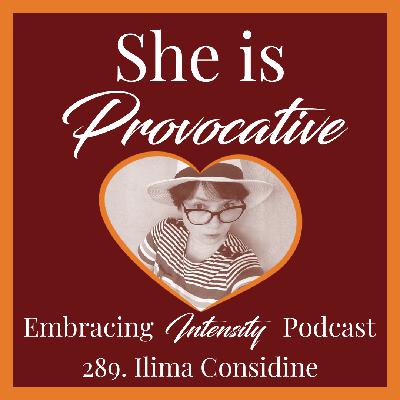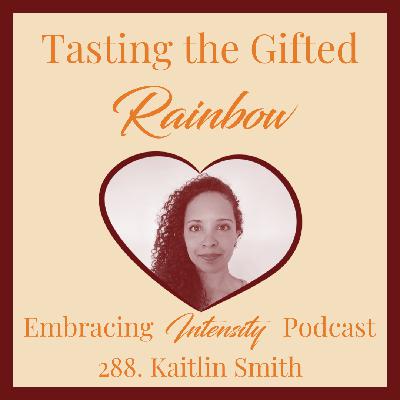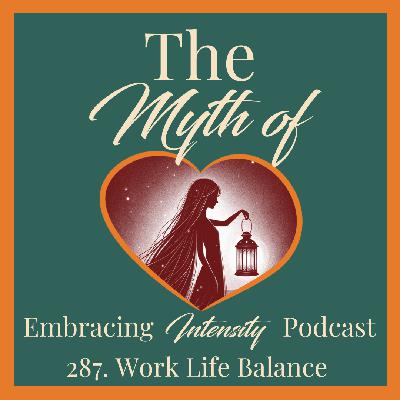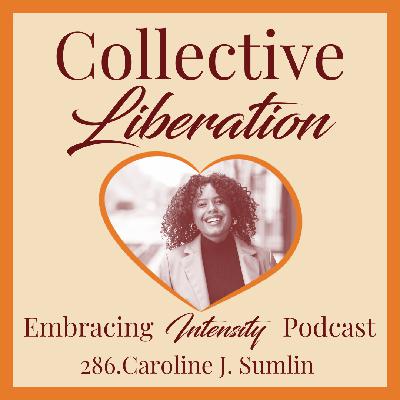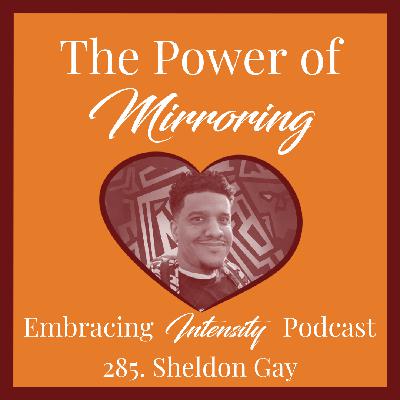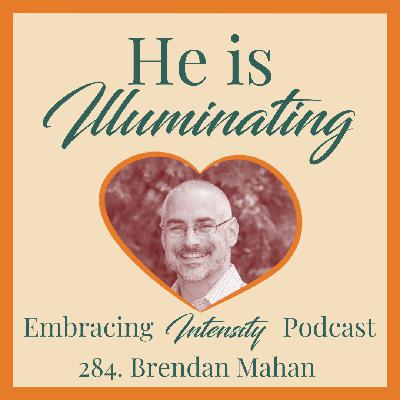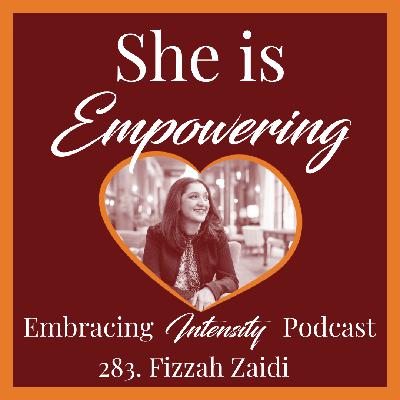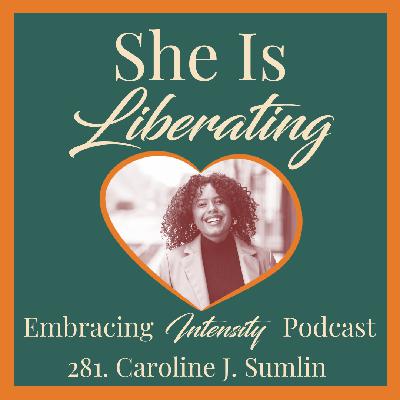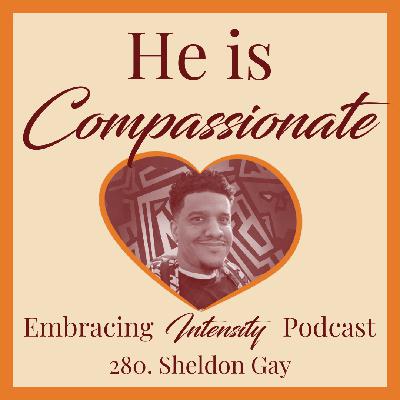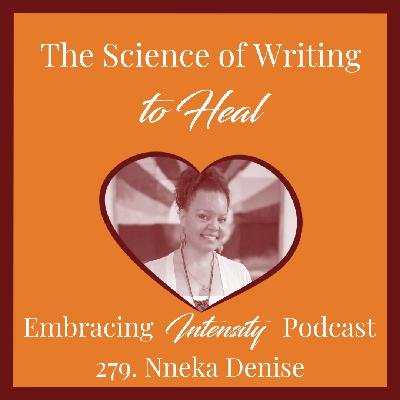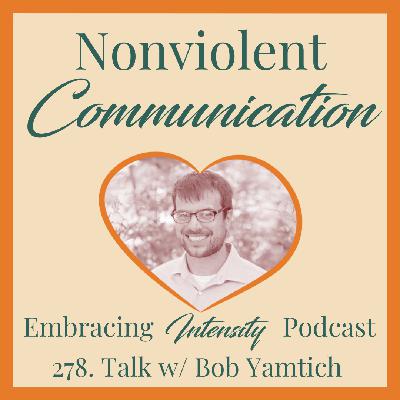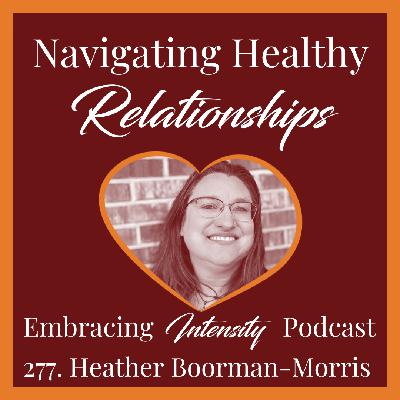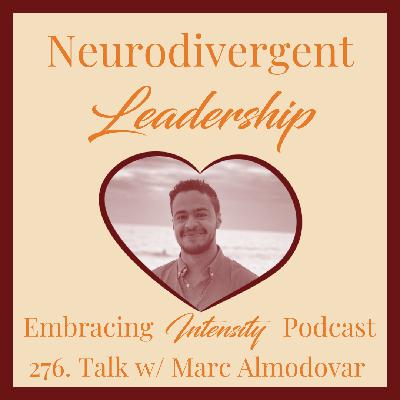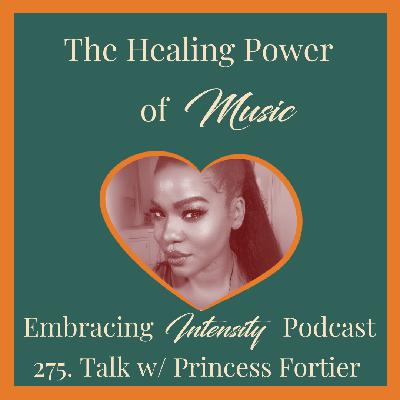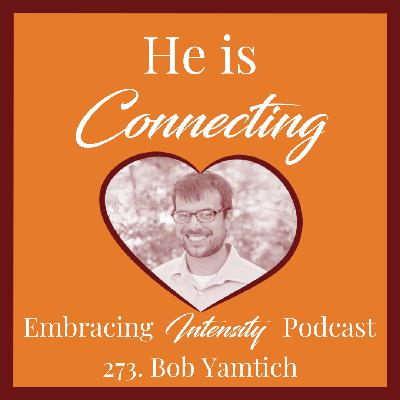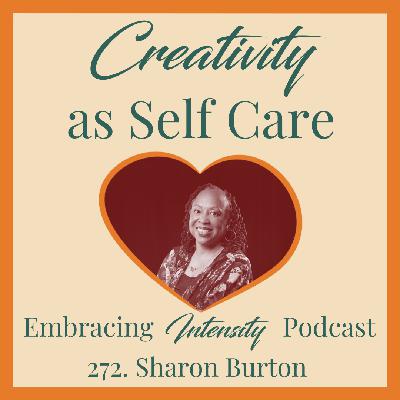Discover Embracing Intensity
Embracing Intensity

Embracing Intensity
Author: Aurora Remember Holtzman
Subscribed: 130Played: 4,193Subscribe
Share
Description
Have you ever felt like you're "too much?" Too intense? Too consumed by whatever life has in store, that you cannot ever feel fulfilled? Aurora Remember Holtzman has news: you are not too much. Perhaps you simply haven't embraced your naturally excitable self? In "Embracing Intensity," Aurora will take everything you think you know about what it means to be intense and excitable, and show you how intensity is not a weakness but a hidden power. Each week, Aurora will interview a strong, creative, and sensitive woman who embodies what it means to embrace intensity in order to show you how to embrace your life in its fullest. Listen to unlock ways to unleash your inner fire— without getting burned!
225 Episodes
Reverse
This week on Embracing Intensity, I'm thrilled to finally sit down with the powerful and passionate Inger Shaye Colzie, a therapist and coach working at the intersection of ADHD, identity, and cultural experience. Inger shares her journey of being diagnosed with ADHD later in life, after decades of navigating systems and expectations that didn't see her neurodivergence—or the unique challenges that come with being a Black woman with ADHD. Together, we dive into her experiences growing up gifted but overlooked, her path to founding the ADHD Black Professionals Alliance, and how she helps others own their fire and intensity without apology. Inger's insight, humor, and realness make this an episode you won't want to miss. P.S. We're planning to bring Inger back for a guest call in the Embracing Intensity Community during the 2026 speaker season—I'd love your feedback on upcoming topics and guests! About Inger Shaye Colzie Inger is a therapist, ADHD coach, and the founder of the ADHD Black Professionals Alliance. Diagnosed later in life, she now uses her lived experience, clinical knowledge, and coaching tools to support other Black women navigating life, work, and relationships with ADHD. Through her practice and community, she creates spaces for healing, advocacy, and unapologetic self-discovery. In This Episode: The experience of being undiagnosed with ADHD well into adulthood—and what finally led her to seek answers Growing up as an intense, passionate child whose energy was often misunderstood Why culturally relevant care is essential for Black women with ADHD The emotional impact of living with ADHD in a world not built for neurodivergent minds How diagnosis and coaching helped her reframe her identity and harness her gifts Creating the ADHD Black Professionals Alliance as a safe and empowering space Turning down the dial—or turning it up with intention The importance of coaching, community, and embracing your whole self Resources & Links: Inger Shaye Colzie's Website & Coaching Info (link to be added) ADHD Black Professionals Alliance: [Website or community link] Join the Embracing Intensity Community Whether you're navigating ADHD yourself or supporting others who are, this episode offers compassion, clarity, and community. Inger's story is a reminder that it's never too late to rewrite the narrative—and that when we embrace our fire, we light the way for others. 🎧 Listen now and share with someone who needs to hear they are not broken—just unseen.
Episode 290: Executive Functioning with Fizzah Zaidi In this powerful episode of Embracing Intensity, I'm joined by the insightful and compassionate Fizzah Zaidi, a psychotherapist who specializes in working with neurodivergent individuals. We explore the complexities of executive functioning, and how understanding our brain's unique operating system can transform how we show up for ourselves and others. Fizzah brings deep experience from her work with high-achieving neurodivergent clients in the tech, medical, and legal fields. Together, we discuss how neurodivergent brains often struggle not because they're broken, but because they're functioning differently—and those differences can also be sources of strength. About Fizzah Zaidi Fizzah Zaidi is a Chicago-based psychotherapist with a passion for working with neurodivergent adults. Her practice supports many twice-exceptional individuals in high-demand professions, and her work includes educating organizations on how to better support neurodiverse teams. Diagnosed with ADHD just before entering graduate school, she dove deep into understanding the brain and executive functioning through continuing education and real-world application. In This Episode: Why rest isn't always about being still—and how energizing activities can also be restorative. The link between executive dysfunction and rejection sensitivity. How big-picture thinkers can better support task initiation and follow-through. Understanding the role of the prefrontal cortex and limbic system in executive functioning. Why complex tasks might be easier than basic ones for some neurodivergent folks. The importance of personalized strategies over one-size-fits-all "fixes." Using self-regulation instead of self-control to support executive function. Shifting the mindset from "fixing" to understanding your operating system. 🔗 Resources & Links Fizzah Zaidi's Website Join the Embracing Intensity Community Find Workbooks Embracing Intensity Guest Call Library
In this week's episode, Aurora sits down with Portland-based multidisciplinary artist and filmmaker Ilima Considine to explore how neurodivergence, art, music, and personal experience intersect to spark powerful creative expression. Ilima shares her journey through long COVID, chronic illness, and how she channels her intensity into film, empowering others in the process. As Ilima prepares to premiere her second feature-length film, Drug Holiday, she talks about the themes of trauma, addiction, and radicalization—and how they resonate with creative and neurodivergent communities. This conversation dives deep into how one artist transforms challenges into bold storytelling. 🎨 About Ilima Ilima Considine is best known as the frontwoman for the Sexbots and a multidisciplinary artist whose work spans music, visual art, and now film. After a severe bout of long COVID altered her career trajectory, Ilima dove headfirst into filmmaking, combining sound, visuals, and narrative to explore themes that are often hard to talk about—like grooming, neurodivergence, and societal trauma. ✨ In This Episode: How chronic illness and neurodivergence have shaped Ilima's creative process The story behind Drug Holiday, and how it reflects real-life struggles with trauma and radicalization The overlap between neurodivergent traits and the arts—and how Ilima fosters a safe space for collaborators Embracing intensity as a strength in both personal and professional life Why Portland became a haven for embracing eccentricity and creativity The value of harnessing hyperfocus and obsessive attention to detail Using film to bring light to dark topics in accessible, artistic ways Ilima's philosophy on directing: accommodating individual needs to help artists thrive Her own experiences with burnout, energy management, and the use of stimulants during film production 🔗 Resources & Links: Ilima's Website Check out her band: The Sexbots Watch Drug Holiday (Premiering Nov. 14th at Mission Theater, Portland) Join the Embracing Intensity Community 🎬 Whether you're an artist, a neurodivergent creative, or someone navigating chronic health challenges, Ilima's story is a powerful reminder that you can channel your fire into something deeply meaningful—and bring others along with you.
In this deeply insightful guest call, we welcome Kaitlin Smith, a PhD candidate in the history of science at Harvard with a secondary focus in African American Studies. Kaitlin brings a powerful lens to the conversation around giftedness, drawing from her academic research, clinical background, and personal experience as a former support provider for gifted and intense Black adults. This episode explores the intersections of giftedness, race, history, science, and social narratives—inviting us to reexamine what we consider "normal" and how systemic forces shape our understanding of intelligence and identity. A Scholarly Look at Diverse Expressions of Giftedness with Kaitlin Smith Join us for an enlightening session with Kaitlin Smith, MSW -- founder of Our Wild Minds -- in which we will explore diverse lived experiences of giftedness that people have in light of differences in social identity (e.g., race, gender, class, and spirituality). Kaitlin will share insights derived from scholarly research and personal experience, shedding light on how social forces and historical developments influence the recognition and experience of gifted traits. Attendees will engage with ideas that illuminate often-overlooked aspects of your intensities and learn strategies that will help you celebrate your (and others') multitudes. About Kaitlin: Kaitlin Smith, MSW is a writer, facilitator, and Ph.D Candidate at Harvard in the Department of History of Science where she is developing a dissertation on the history of the field of Black Psychology. Kaitlin is also the former founder of Our Wild Minds which offers online community and in-person experiences for highly creative, intellectually intense, and/or gifted Black adults from all over the world. Kaitlin's research and work with Our Wild Minds is informed by past training and work as a psychotherapist. 🔍 In This Episode: The history of psychological science and its impact on marginalized identities Kaitlin's personal experience with racism and bias in clinical training How the field of Black psychology emerged in resistance to biased systems Case studies including Oscar Moore and the Larry P v. Riles court case How Donna Haraway's concept of situated knowledges can inform gifted advocacy The danger of universalizing objectivity in science and education Using historical context to reframe personal experiences of giftedness Opportunities for collective solidarity and support in gifted communities Questions for self-reflection around situated knowledge and identity 📚 Resources: Join the Embracing Intensity Community Kaitlin Smith's gifted resources Kaitlin's Substack 💬 Access the Extended Discussion in the Guest Call Library or All-Access Membership! A rich Q&A on the intersection of giftedness, race, and gender, and how these identities interact in systemic settings Reflections on how trauma and neurodivergence shape each other across personal and collective histories Insightful audience comments on the importance of reclaiming educational and psychological language Exploration of "the gifted rainbow" as a metaphor for the complexity and beauty of diverse gifted identities Practical examples of how to create supportive spaces for gifted and twice-exceptional Black individuals Honest conversation about grief, joy, and the non-linear journey of self-discovery as a neurodivergent person Kaitlin's take on integrating history, embodiment, and radical curiosity into both academic and personal healing
Is work-life balance real—or just another unrealistic expectation? In this solo episode of Embracing Intensity, I unpack the myth of work-life balance and share my journey toward something more meaningful: harmony. Drawing from my personal life, this episode dives deep into how neurodivergent people navigate work hours, personal time, and the demands of life in a way that feels aligned, not forced. After a summer of restoration and reflection, I'm back working full-time in the school system—and instead of chasing "balance," I'm creating sustainable rhythms that honor my energy, creativity, and mental health. About Aurora I'm Aurora Remember Holtzman, host of Embracing Intensity and creator of the Embracing Intensity Community. With years of experience working with gifted, twice-exceptional, and neurodivergent folks, I help people stop beating themselves up for not meeting arbitrary standards and start living in alignment with their core values. My goal? To help you use your intensity as a tool for transformation—without burning out. In This Episode: Why the concept of work-life balance might be doing more harm than good Reframing productivity, especially for different people with unique brain wiring How long hours and unrealistic expectations lead to burnout The power of aligning with your core values instead of external goals How "contaminated time" steals joy from our personal lives Tools like energy audits to help create real work-life harmony Letting go of hustle culture and embracing meaningful work Tips for reclaiming quality time and rest—even with full work hours Why the opposite of life isn't work—but disconnection 🔗 Resources & Links: 🔥 Join the Embracing Intensity Community 📘 Energy Balance Workbook (Print & Kindle) ✨ Balancing Time & Energy Digital Guide ✨ Balance is a myth. Harmony is the goal. Tap into your own rhythm and reclaim your time, energy, and creativity—on your terms. 🎧 Listen now on EmbracingIntensity.com
In this powerful episode of Embracing Intensity, we welcome Caroline J. Sumlin—author of We'll All Be Free—for a deep, vulnerable, and inspiring conversation about collective liberation, the impact of white supremacy culture, and how we can begin to reclaim our worth. Caroline shares her perspective as a neurodivergent mother, speaker, and educator, and we explore the intersection of self-worth, systemic oppression, and sustainable social justice work. About Caroline J. Sumlin Caroline is an author, speaker, and homeschool parent living in the Washington D.C. area. Her work centers on liberation from white supremacy culture, with a focus on how systemic oppression impacts self-worth. Her book, We'll All Be Free, is a guide to deprogramming the internalized messages of white supremacy and reclaiming your true self. Caroline's mission is to help others recognize the worth that oppressive systems have tried to erase. In This Episode: The importance of understanding how white supremacy culture harms everyone—not just the most marginalized. Why urgency, productivity, and perfectionism are tools of white supremacy—and how to break free. Navigating motivation and urgency as a neurodivergent person. Creating a life of joy and balance while staying engaged in liberation work. The importance of connecting with our shared humanity in social justice conversations. Understanding collective harm and our responsibility in collective healing. Caroline's perspective on using privilege for good and deconditioning colonial thinking. Resources & Links: Caroline J. Sumlin's Website We'll All Be Free – Caroline's Book Follow Caroline on Instagram Join the Embracing Intensity Community
In this thought-provoking episode of Embracing Intensity, Aurora sits down with Sheldon Gay, host of the I Must Be BUG'N podcast, which amplifies the stories and voices of Black, unidentified, underrepresented, gifted, and otherwise neurodivergent people. Sheldon is deeply insightful, warm, and grounded in his advocacy to humanize the neurodivergent experience. Together, they dive into the power of mirroring—that magical moment when we see ourselves reflected in others—and how it plays a crucial role in identity, belonging, and connection. Sheldon shares his personal journey discovering his giftedness later in life and how joining neurodivergent spaces offered a profound sense of home and validation. He speaks candidly about emotional giftedness, navigating systems that often don't recognize or affirm difference, and the importance of compassion, boundaries, and self-trust. ✨ In this episode: What mirroring means and why it's vital for neurodivergent people How Sheldon discovered his giftedness and launched I Must Be BUG'N Why IQ tests don't tell the whole story of intelligence or giftedness Emotional giftedness, self-doubt, and how we process emotions Compassion and boundaries in spaces where we feel misunderstood Recognizing our gifts even when others don't The power of community connection and storytelling Insights into upcoming collaborative projects with Sheldon, including neurodivergent-friendly apps Reflections on Aurora's recent blog post on neurodivergent relationships 🔗 Resources & Links: I Must Be BUG'N Podcast Embracing Intensity Community Aurora's Blog Post on Neurodivergent Relationships Intuitive Flow Podcast Episode Whether you're just beginning your journey or deep into exploring your neurodivergent identity, this conversation is a reminder that you are not alone—and that your experiences, brilliance, and emotions are valid and worthy of being seen. 🎧 Listen now and feel seen.
This week on the Embracing Intensity podcast, I'm thrilled to welcome back the always thoughtful and illuminating Brendan Mahan, founder of ADHD Essentials and creator of the Wall of Awful. In this free-flowing and deeply relatable conversation, we dive into the realities of ADHD burnout, navigating screen time, and what it really means to rest. Brendan and I both share personally about our own experiences with burnout and recovery, and how we're learning to work with our neurodivergent brains instead of against them. About Brendan Mahan: Brendan Mahan is a speaker, coach, and host of the ADHD Essentials Podcast. He specializes in helping families, educators, and individuals better understand ADHD through metaphor, structure, and compassion. Brendan is known for his "Wall of Awful" model—a powerful visual metaphor that helps people identify and move through the emotional blocks that make motivation so hard for those with ADHD. He's currently working on a book titled Overcoming the Wall of Awful, expected to release in 2026. In This Episode: The difference between hard fascination and soft fascination, and why the latter is key for real rest What the Default Mode Network is and how it affects neurodivergent minds How screen time mimics rest but often leads to hard fascination and further mental exhaustion The origins of the Wall of Awful and how it helps people understand motivation challenges Tools Brendan uses to access soft fascination, from walks in the woods to weighted pressure The idea of contaminated time and how it sabotages meaningful rest Navigating professional transitions and creative burnout Letting go of transactional relationships and leaning into transformational connection Using Maslow's Hierarchy of Needs to intentionally rebuild from burnout How embracing your values and regulating sensory input can be powerful tools for recovery Reframing burnout as a "season" and holding onto hope that things can and do change 🎧 Tune in to hear a heartfelt, relatable conversation on burnout, ADHD, and the power of slowing down with intention. Whether you're deep in burnout or on the road to recovery, this episode offers compassionate insights and practical tools to help you find your way back to balance. Resources & Links: Brendan Mahan – ADHD Essentials The Wall of Awful on How to ADHD (YouTube) Embracing Intensity Community
In this inspiring episode of Embracing Intensity, I'm joined by the vibrant and insightful Fizzah Zaidi, a psychotherapist based in Chicago who works with adults with ADHD, especially those navigating high-pressure environments like tech and finance. We originally connected at an ADHD conference over boots and breakfast, and I'm so excited to bring her energy and wisdom to the podcast! Fizzah shares her journey from a creative career in animation to becoming a mental health professional, her passion for social justice, and how she uses her intensity to empower her clients. Together, we explore what it means to navigate neurodivergence with curiosity, creativity, and self-compassion. About Fizzah Zaidi: Fizzah is a psychotherapist and former animator who brings her creative flair and social justice focus into her therapeutic practice. Working primarily with high-achieving adults in the finance and tech sectors, she specializes in supporting ADHD and twice-exceptional individuals as they navigate complex challenges in both personal and professional settings. Her approach is multimodal, trauma-informed, and deeply rooted in empathy, humor, and the belief that everyone deserves someone who truly believes in them. In This Episode: How Fizzah uses creativity and multimodal therapy to connect with clients The role of social justice in her personal and professional intensity Navigating cultural stigma around mental health and emotional expression Toning down to survive: childhood masking and fear of judgment Channeling intensity into advocacy: challenging grad school policies while pregnant Why "being kind to yourself" means embracing your human moments The power of curiosity and education in making sense of your neurodivergent brain Executive function myths: the difference between lacking skills vs. activation Building community care, challenging black-and-white thinking, and supporting clients in discovering their fire Conclusion: Fizzah reminds us that intensity can be a powerful force for justice, healing, and growth when it's supported and expressed authentically. Her story highlights the importance of giving ourselves permission to feel, question, and grow in our own unique ways—and supporting others as they do the same. Whether you're navigating neurodivergence, embracing your emotional depth, or looking for ways to channel your fire, this episode will leave you feeling seen and inspired. 🎧 Tune in now and discover how you, too, can embrace your intensity and turn it into your greatest strength. Resources & Links: Fizzah Zaidi Psychotherapy Website: fzpsychotherapy.com Connect with Fizzah via Email: Available through her website Located in Chicago? Reach out and grab coffee with Fizzah! PowerZone Toolkit Challenge (Free & Evergreen): embracingintensity.com/toolkit Join the Embracing Intensity Community: community.embracingintensity.com
After a bit of a break from long-form content, I'm so excited to be back with a solo episode that's deeply personal and incredibly timely. I've missed connecting with you more intimately through the podcast and am looking forward to bringing you more episodes like this in the coming months. Lately, I've been diving into the topic of neurodivergent burnout, something I've experienced firsthand and that I know many of you can relate to. I've written two blog posts on the topic and shared a companion video on YouTube—and even tested out long-form content on TikTok for the first time! This episode is a heartfelt exploration of what burnout can look like for those of us who are gifted, ADHD, autistic, or otherwise neurodivergent, and how we can begin to recover and reconnect with our energy and purpose. About My Experience of Burnout: Over the last three years, I've been working through the most intense burnout of my life. It started during the pandemic and lingered far beyond, as I struggled to return to the rhythms of daily life in a world that never truly went "back to normal." Like many neurodivergent individuals, I found myself caught in a cycle of urgency, executive dysfunction, emotional exhaustion, and identity loss—especially as a twice-exceptional adult who spent years masking and pushing through. Throughout this episode, I share how I began healing by shifting my energy focus, consuming more uplifting media, and building out my self-regulation toolkit. These small but impactful steps helped me start to climb out of burnout and reconnect with my values and purpose. In This Episode: What neurodivergent burnout really is and how it differs from general burnout The impact of executive dysfunction, sensory overload, and masking The "gifted kid burnout" problem and how identity gets tangled in achievement How urgency culture creates cycles of burnout and crash Using the "circle of influence" vs. "circle of concern" to refocus energy Shifting media consumption and moving from doomscrolling to hope scrolling The importance of community care and authentic connection Building a personalized self-regulation toolkit for long-term energy balance Learning to ask for help and receive support without guilt A reminder: burnout is not a personal failure—it's a survival response Burnout is an all-too-common challenge for neurodivergent people, and it often looks very different from what the general population might expect. For autistic people, ADHD burnout, and other forms of neurodivergent burnout, it's not just about long hours or hard work—it's about the constant effort of navigating a neurotypical world without adequate support. The neurodivergent mind processes sensory input, social interaction, and executive function tasks in different ways, often leading to sensory processing issues and emotional exhaustion. Many autistic adults and neurodivergent individuals experience a greater risk of burnout due to the compounding effects of chronic stress, loss of skills, and a deep lack of motivation when support systems are not in place. While neurotypical people may recover from burnout with rest alone, a neurodivergent adult often needs more nuanced strategies to heal—ones that take into account their unique neurodivergent traits, sensory experiences, and cognitive abilities. Burnout can also exacerbate mood disorders like anxiety disorder and obsessive-compulsive disorder. Unfortunately, many family members, employers, and even mental health professionals may overlook these common causes, failing to provide the school accommodations, social support, or safe place needed for recovery. Whether it's through personal experience, insights from advocates or participation in online communities, it's clear that understanding the term neurodivergent and how it manifests is crucial. Supporting autistic children, ADHD individuals, and all neurodivergent people in reaching their full potential means meeting human needs, addressing sensory processing issues, and creating an ideal world where burnout is not the norm—but a sign that something deeper must be healed. If you've been feeling like you're constantly pushing through exhaustion, struggling to find balance, or wondering why everything feels so hard—you are not alone. Neurodivergent burnout is real, and it's not a reflection of your worth or capability. It's a signal that your needs deserve more care, compassion, and community support. Let this episode be a gentle reminder that your intensity is not too much, your rest is valid, and your healing matters. I'd love to hear from you—what topics would you like me to explore further on the podcast? And if you're ready to start building your own toolkit for energy balance and self-regulation, check out the PowerZone Toolkit Challenge, now available anytime you need it. 🎧 Listen now and take your next step toward recovery and reclaiming your energy. Resources & Links: PowerZone Toolkit Challenge (now evergreen & free!) Join the Embracing Intensity Community Watch the video on YouTube Follow on TikTok & Instagram: @embracingintensity
In this episode of Embracing Intensity, host Aurora Remember sits down with Caroline J. Sumlin, author of We'll All Be Free: How a Culture of White Supremacy Devalues Us and How We Can Reclaim Our True Worth. Together, they explore the intersection of intensity, self-worth, and collective liberation. Caroline shares her journey from feeling like she was "too much" to reclaiming her intensity as a gift. They dive into how societal systems—especially those rooted in white supremacy—fuel perfectionism, hustle culture, and the feeling of never being good enough. This conversation is both deeply personal and action-oriented, offering tools for doing the inner work to break free from these toxic systems and reclaim your inherent worth. About Caroline J. Sumlin: Caroline J. Sumlin is a writer, speaker, and educator whose work focuses on dismantling the toxic cultural messages rooted in white supremacy that tell us we are never enough. She empowers individuals—especially Black women and other marginalized communities—to reclaim their self-worth and reimagine a liberated, fulfilling life. Her book, We'll All Be Free, blends personal narrative, social commentary, and actionable guidance to help readers break free from perfectionism, self-doubt, and societal pressure. In This Episode: The Never-Enough Culture – How systems of white supremacy drive perfectionism and keep us striving to prove our worth. Intensity as a Gift – Caroline's journey from being labeled "intense" to recognizing her passion as a source of power. Masking and Cultural Expectations – The pressure on Black women to tone down their true selves and "fit in." Self-Discovery as Liberation – Why examining how systems shape our beliefs is essential to personal and collective freedom. Finding Outlets for Intensity – How Caroline channels her energy through writing, tennis, acting, and music. The Power of Rest and Reclaiming Time – How rest can be a radical act of resistance in a culture that values productivity over well-being. Navigating ADHD and Giftedness – Caroline's exploration into her own possible neurodivergence and her daughter's twice-exceptionality journey. Ripple Effect Change – Why small, intentional actions can lead to lasting, collective transformation. Key Takeaways: Your worth is not tied to your productivity. Systems of oppression benefit from keeping us feeling "not enough." Intensity is a strength when you learn to embrace and channel it. Rest is a radical act of resistance against hustle culture. Small, personal shifts can ripple outward to create collective change. Resources & Links: Caroline's Website Follow Caroline on Instagram & Threads: @carolinejsumlin Book: We'll All Be Free – Support independent bookstores via Bookshop.org Embracing Intensity Community Embracing Intensity Mastermind (Coupon Code: EARLYBIRD25) Twice-Exceptionality Stories Playlist (YouTube)
In this episode of Embracing Intensity, I'm thrilled to welcome Sheldon Gay, host of the I Must Be Buggin' podcast. Sheldon brings his insightful perspective on navigating life as a late-identified gifted and neurodivergent individual. His podcast and work are dedicated to amplifying underrepresented voices and empowering others to embrace their unique identities. We explore the challenges and beauty of being true to oneself in a world that often misunderstands intensity, neurodivergence, and giftedness. Sheldon's passion for self-discovery, emotional depth, and compassionate communication shines through in this powerful conversation. About Sheldon: Sheldon Gay is the host of the I Must Be Buggin' podcast, where he delves into topics of identity, giftedness, and neurodivergence through the lens of being Black, underrepresented, and gifted. His mission is to create a space for self-awareness, acceptance, and growth, while helping others see and embrace their unique strengths. Sheldon's background as a late-identified gifted and neurodivergent individual has fueled his passion for helping others on their journey of self-discovery. He brings a thoughtful, empathetic approach to conversations on identity, culture, and the power of authenticity. In This Episode: Navigating Identity as a Late-Identified Neurodivergent Individual – Sheldon shares his journey of discovering his giftedness and neurodivergence later in life. Ask vs. Guess Culture – A deep dive into communication styles, cultural nuances, and how self-awareness can help bridge differences. The Power of Self-Discovery – Reflections on how shadow work and embracing authenticity can lead to freedom from shame and guilt. Intensity and Emotional Depth – Exploring how Sheldon's intellectual curiosity and emotional intensity shape his interactions and relationships. Cultural Expectations and Exceptionalism – Discussing the pressures faced by marginalized communities and how giftedness intersects with cultural identity. Truth with Compassion – The importance of sharing truth in ways that create connection and understanding rather than division. Resources & Links: Sheldon's Website: Sheldon Gay is Buggin Listen to the I Must Be Buggin' podcast Learn more about Sheldon's speaking engagements Explore his neuroaffirming and anti-racist merchandise Join the Embracing Intensity Community Connect with Aurora: Embracing Intensity Sheldon's thoughtful reflections and passion for empowering others provide invaluable insights for anyone navigating their own journey of self-discovery and authenticity. Tune in for an engaging and inspiring conversation! Listen now and share your thoughts with us! 🎧✨
The Science of Writing to Heal with Nneka Denise In this episode of Embracing Intensity, we're excited to share the Q&A portion of our powerful conversation with Nneka Denise, founder of the Write to Heal Project. This discussion offers timely tools and insights as we reflect on letting go of the past year and preparing for a fresh, intentional start in the new year. Nneka shares her transformative approach to healing through writing, addressing grief not only as it relates to loss but also to life transitions, personal growth, and emotional clarity. Whether you're navigating stress, seeking emotional release, or exploring creative outlets, this episode provides practical strategies to help you move forward. About Nneka Denise Nneka Denise is the founder of the Write to Heal Project and a trained end-of-life and bereavement doula based in the Portland-Vancouver area. Through journaling, visualization, and somatic practices, Nneka helps individuals process grief, trauma, and life's emotional challenges. She also runs the New Wellness Center in downtown Portland, a collective of holistic healing practitioners offering vibrational sound baths, Reiki, massage, and emotional wellness support. In This Episode: The Science of Writing to Heal – How writing can help process emotions, grief, and transitions in life. Practical Writing Strategies – Tips for using gratitude journaling, brain dumps, and affirmations to create a daily healing practice. Ceremonial Release – The power of burning or shredding written emotions as a symbolic act of letting go. Affirmations for Healing – How to create affirmations that feel believable and achievable, guiding you toward positive change. Navigating Writing Challenges – Nneka's advice for those with ADHD, dyslexia, or writing apprehensions, including voice dictation and alternative methods. Resources & Links: Connect with Nneka on Instagram: @nneka_denise Contact Nneka via email: nneka.denise@gmail.com Learn about the New Wellness Center in Downtown Portland (10th & Morrison) Explore the Embracing Intensity Community and Memberships. Preorder Aurora's workbook, Energy Balance (Kindle edition), available this Friday, December 20th. Nneka's work offers invaluable tools for self-reflection, healing, and emotional growth through the simple yet profound act of writing. Whether you're a lifelong journaler or just beginning your healing journey, this episode is packed with actionable insights to help you process emotions and step into the new year with intention. Listen now and take the first step toward embracing your own healing process! 🎧✨
In this highly engaging episode of the Embracing Intensity podcast, host Aurora Remember Holtzman dives deep into the world of Nonviolent Communication (NVC) with Bob Yamtich, a seasoned practitioner with over 20 years of experience. Bob shares how NVC has shaped his approach to relationships, parenting, and self-understanding, particularly as a neurodivergent individual. This conversation is packed with practical insights and tools for those seeking to enhance their self-connection and interpersonal communication. About Bob Yamtich: Bob Yamtich is a dedicated Nonviolent Communication trainer, therapist, and engineer. His journey into NVC began after his career as an environmental engineer, driven by his desire to contribute to societal change through better communication. Bob's unique approach integrates empathy with analytical insights, honoring the importance of neurodivergence in his work and personal growth. He is a passionate advocate for using NVC as a bridge between self-awareness and impactful communication. In This Episode: Bob's personal journey with Nonviolent Communication and how it helped him find balance as a bipolar individual. The core principles of NVC: self-connection, empathy, and honesty. How to distinguish between needs and strategies, and why it matters in communication. The concept of holding multiple needs and strategies simultaneously for resilience and creativity. Balancing analytical insights with empathy in understanding neurodivergence. Practical exercises, including identifying three current needs and corresponding strategies. How NVC fosters community, shared power, and collaborative problem-solving. Bob's experiences teaching NVC to diverse audiences, including children and incarcerated individuals. The shift from "battle mode" to "build mode" in creating meaningful connections. Links and Resources: Learn more about Nonviolent Communication and its principles here. Learn more about Bob on his website! Explore Aurora's Neurodivergent Toolbox and other resources at the Embracing Intensity Shop. Get 25% off Aurora's digital products and memberships with code BIRTHDAY24 (valid until Dec 2). Whether you're new to Nonviolent Communication or a seasoned practitioner, this episode offers valuable insights and actionable strategies for enriching your connections with yourself and others. Tune in for a thought-provoking and uplifting discussion!
This episode of the Embracing Intensity podcast, features a detailed conversation with Heather Borman Morris about understanding narcissistic relationships and how they uniquely affect gifted and neurodivergent individuals. Heather, a clinical social worker, shares her personal experience with narcissistic abuse, providing insights on identifying covert narcissism versus mere intense interest, particularly in neurodivergent or twice-exceptional individuals. The discussion delves into strategies for recognizing and managing toxic relationships, differentiating between narcissism and authentic behaviors, and emphasizes the need for understanding personal boundaries and fostering healthy relationships post-abuse. The episode also introduces Heather's work, including her book 'A Thousand Paper Cuts' and the podcast 'Starting Stronger'. About Heather: Heather Boorman-Morris is a renowned therapist, speaker, and author dedicated to helping individuals heal and thrive after experiencing toxic relationships. With over two decades of experience in the field, Heather specializes in trauma recovery, relationship dynamics, and neurodivergent mental health. She is the founder of Starting Stronger and the author of the acclaimed book Thousand Paper Cuts: Finding Healing in the Aftermath of a Narcissist. Heather's compassionate approach and deep understanding of complex emotional landscapes make her a sought-after expert in the journey towards healthy, fulfilling relationships. In this episode: Heather joins the podcast to discuss navigating healthy relationships, focusing on narcissistic abuse. Heather shares her experience of being in an abusive relationship and later discovering covert narcissism. Discussion on the targeting of neurodivergent individuals by narcissists, highlighting their traits like empathy and ambition. Differences between overt and covert narcissists are outlined, including their stages of relationship: idealization, devaluation, and discard. Strategies like mirroring used by manipulators in relationships are explained. Emphasis on trusting one's body and intuition as indicators of being in a toxic relationship. Conversation on distinguishing between love bombing and genuine neurodivergent intensity. Importance of taking time to build relationships and recognizing genuine intentions. Discussion about the impact of past trauma and hyper-vigilance when forming new relationships. Resources: Join our Community & Check out our calendar of upcoming events! Embracing Intensity Memberships Starting Stronger Podcast A Thousand Papercuts Interoception Website
In this enriching episode, Aurora hosts Marc, who shares his profound insights on neurodivergent leadership. Marc introduces himself by recounting his journey with ADHD, from his early school years to receiving his diagnosis at 16. This pivotal moment spurred him to embrace and understand his unique brain function, leading to his certification as an ADHD life coach. Marc speaks proudly of founding the Men's ADHD Support Group, a 501c3 nonprofit with over 17,000 members, aiming to empower men with ADHD. He emphasizes the importance of leveraging the inherent strengths of neurodivergent individuals rather than conforming to societal norms. Marc's empathetic and mentorship-driven leadership style, rooted in his personal experiences, serves as a testament to the potential and efficacy of neurodivergent leaders. He addresses challenges such as imposter syndrome, the importance of passion in leadership, and strategies for effective communication within his organization. The discussion also touches on the nuances of the ADHD label, stressing a balanced view that acknowledges both strengths and challenges. About Marc: Marc Almodovar Jr. is a neurodiversity advocate and the founder of the ADHD Men's Support Group, a safe space where men with ADHD can connect with others who share common experiences and challenges. Marc's personal experience with ADHD led him to feel isolated and misunderstood, and he recognized the need for a supportive community. He believes that by fostering a sense of belonging and acceptance within the group, men with ADHD can advocate for neurodiversity awareness and acceptance within society as a whole. As a mental health advocate, Marc recognizes the stigma surrounding mental illness and strives to create a space where men with ADHD can feel safe and supported regardless of their unique ways of thinking and experiencing the world. He is passionate about raising awareness about neurodiversity and helping people understand the diverse ways in which people experience the world. With a balance of authenticity and positivity, Marc inspires others to embrace their unique strengths and connect with others within the neurodiverse community. In this episode: Marc discusses his experience with ADHD, including his diagnosis at 16 and its impact on his life. He shares how understanding his brain led him to personal development and becoming an ADHD life coach. Founding the Men's ADHD Support Group, a non-profit organization with over 17,000 members. People with ADHD often have strong leadership qualities. Leveraging strengths rather than conforming to societal norms. The importance of mentorship and leading by example. Personal and societal challenges neurodivergent leaders face, such as imposter syndrome and self-criticism. The value of self-affirmations and support systems in overcoming these challenges. Negative feedback and misconceptions about ADHD, especially related to gender. The need for safe spaces for men with ADHD and dispelling myths around the condition. Giving constructive feedback while staying authentic. Using "kind candor" and focusing on team collaboration to improve feedback delivery. Resources available for partners of men with ADHD, including support groups and public content. The debate around viewing ADHD as a gift versus a disorder. Recognizing both the strengths and challenges of ADHD without labeling it strictly as one or the other. Resources: Join our Community & Check out our calendar of upcoming events! Embracing Intensity Memberships Join the ADHD Men's Support Group Follow the ADHD Men's Support Group on Twitter Follow Marc on Twitter
This week on the Embracing Intensity podcast, host Aurora discusses the transformative power of music with guest Princess Fortier. Princess shares her personal journey of using singing to alleviate her chronic migraines, which began at the age of 13. Despite initially pursuing neuroscience to find a medical cure, she discovered that singing provided significant relief from her symptoms. Aurora and Princess delve into how music can relax, heal, and foster emotional well-being, particularly for those with neurodivergent traits like ADHD and autism. They also explore the importance of community in musical healing practices and offer practical advice for using music and singing as therapeutic tools. Tips for finding and creating musical communities are discussed, along with the benefits of engaging in sound baths and circle singing. About Princess: Princess Fortier is a dynamic musician, speaker, and advocate for mental health and neurodivergence. With a rich background in using music as a therapeutic tool, she has dedicated her career to helping others find healing and self-expression through creative outlets. Princess's work emphasizes the emotional and psychological benefits of music, drawing from her personal experiences and professional expertise to inspire and empower her audience. She is known for her engaging and heartfelt presentations, making complex topics accessible and relatable to diverse audiences. In this Episode: Princess shares how music has helped her understand and process emotions, learn about love, and find healing. Aurora introduces the "Embracing Intensity" podcast, aimed at gifted, creative, twice-exceptional individuals. Moving to a single monthly episode improved downloads. Princess discusses her journey studying neuroscience to find a cure for her migraines. Singing during a migraine attack unexpectedly relieved her symptoms. Aurora opens up Q&A, asking Princess about factors contributing to music helping with migraines. Princess explains the potential of music to relax and align with one's purpose, influencing mental and physical well-being. Community involvement in singing and music is encouraged for healing and creativity. Practical suggestions for engaging in music, such as joining choirs or attending sound bowl classes. Discussion on how specific songs and types of music can be personalized for therapeutic benefit. Auroras' philosophy: using her platform to allow others to share their voices. Princess's invitation to explore creating and experiencing music for personal therapy. Closing remarks emphasize continuing conversation and participating in the Embracing Intensity community. Aurora concludes with invitations to join the community for support and access to tools for self-regulation. Resources: Princess on Instagram Princess' Website Join our Community & Check out our calendar of upcoming events! Embracing Intensity Memberships
In this solo episode, I delve into my personal journey of overcoming a prolonged burnout to explore the concept of truly restful rest. I discuss the five areas of energy balance—physical, emotional, mental, social, and connection—from my 'Balancing Your Time and Energy' workbook. Through my experience, including the importance of joy-driven activities, social connections, and the INCUP (Interest, Novelty, Challenge, Urgency, and Passion) framework, I provide practical advice on how to replenish energy reserves effectively. Also, discover the value of doing an energy audit to identify draining versus energizing activities. Learn more about my strategies for achieving genuine rest and explore my workbook collection for further guidance. In this Episode: Experiencing burnout and the importance of restful rest. Five Areas of Energy Balance: Physical, Emotional, Mental, Social, and Connection. Physical Rest: Emphasizes the importance of activities that truly relax the nervous system, like going for walks. Mental Rest: Stresses shifting focus to activities driven by joy rather than duty to avoid energy drain. Emotional Rest: Highlights the significance of assertive actions over anxiety-driven actions. Social Rest: Explains how spending time with comfortable social connections can be energizing. Connection: Discusses the importance of feeling connected to oneself, others, and the world. Motivation Factors: INCUP - Interest, Novelty, Challenge, Urgency, and Passion - as motivational strategies. Urgency: Talks about creating a sense of urgency through public accountability to stay motivated. Challenge: Transforming tasks into challenges to stay engaged and motivated. Interest: Recommends revisiting previous interests to reignite passion. Novelty and Passion: Encourages switching things up to maintain novelty and passion in tasks. Join our upcoming community call on the healing power of music! Resources: Join the Embracing Intensity Community for our upcoming call!
In this episode of the Embracing Intensity podcast, host Aurora Remember Holtzman interviews Bob Yamtich about his journey with intensity, nonviolent communication (NVC), and self-connection. Bob shares his personal experiences with bipolar disorder and hypomania, the importance of shared reality, and his passion for self-connection. He discusses his work, including his self-connection coloring book, and provides insights into the practice of NVC for both self-awareness and enhancing interpersonal communication. Aurora and Bob also delve into the challenges and rewards of forming in-person connections and the role of intensity in their lives. The episode concludes with Bob's emphasis on the foundational role of self-connection in his approach to NVC and a preview of his upcoming live discussion on the topic. About Bob: Bob Yamtich is a therapist and Nonviolent Communication trainer. He completed his Bachelor's in Civil Engineering in 2003, the BayNVC Nonviolent Communication Leadership Program in 2007 (assisting in LP08), and his Master's in Counseling Psychology in 2011. He earned his Marriage and Family Therapist license in California in 2014. He was a founding member of the Da Vinci Center for Gifted Children in Alameda, CA, and Genesis Innovation Academy in Atlanta, GA. Bob currently lives in Indiana and offers phone coaching and in-person training. He can be followed on Twitter @BobYamtich. In this episode: Introduction by Bob about trusting intensity based on shared reality and positive contributions. Aurora introduces Bob Yamtich, mentioning his upcoming talk on Nonviolent Communication (NVC) and their mutual appreciation for NVC. Bob expresses gratitude for being on the podcast. Aurora asks Bob about what he is intensely passionate about; Bob mentions his role as a dad and his professional passion for developing self-connection, highlighting his self-connection coloring book. Discussion on how NVC helps both with self-connection and interpersonal communication. Bob speaks about overcoming hypomania and psychosis, emphasizing the need for stability and shared reality. Bob shares his journey with bipolar disorder and the importance of medication alongside therapeutic practices. Aurora asks about the impact of intensity during Bob's upbringing; Bob shares how his extreme passion led to feelings of guilt and loneliness. Bob mentions his gifted program experience and the importance of having passionate friends. Bob discusses how nonviolent communication helped him rebuild his life and manage his intensity. Aurora and Bob talk about the challenges and benefits of connecting with others in person versus online. Bob reflects on the shadow side of his intensity, including an episode where he buried treasure and was not in touch with shared reality. Emphasis on the importance of self-connection in managing intensity and understanding one's needs. Bob shares a final blessing of self-connection and invites listeners to explore this concept along with empathy and honesty in nonviolent communication. Resources: Bob's Website Embracing Intensity Memberships Join our Community & Check out our calendar of upcoming events!
This week on Embracing Intensity, we share part of our call with Sharon J. Burton on "Creativity as Self-Care." Sharon delves into a chapter from her upcoming book "Creative Sparks" that explores how embracing creativity can be a powerful form of self-care. Through affirmations, inspiration, and practical tips, Sharon will guide attendees on how to use their creative talents to nurture their well-being, reduce stress, and cultivate a more mindful and fulfilling life. Join us for an enlightening discussion on the transformative power of creativity in self-care practices. Join us for an engaging discussion with Sharon, a creativity coach, visual artist, teaching artist, yoga nidra guide, meditation guide, poet, and soon-to-be author. Sharon shares her journey back to art after pursuing a traditional career path and emphasizes the importance of creativity as self-care. The conversation covers themes such as the challenges and joys of embracing creativity at midlife, especially for those who may not have received encouragement earlier in life due to societal pressures towards more conventional careers. Sharon introduces her upcoming book, 'Creative Sparks: 21 Affirmations and Inspirations for Creativity at Midlife,' aimed at inspiring people to reconnect with their creativity. The discussion also explores the significance of creativity for personal growth, mental health, and cultural expression, particularly within the African American community. Additionally, it addresses overcoming common obstacles like the inner critic, imposter syndrome, and societal expectations, encouraging listeners to give themselves permission to explore their passions and creative impulses fully. About Sharon Sharon J. Burton is a visual artist, art curator, poet and certified creative coach and Founder of Spark Your Creative Coaching. Since 2016, she has focused on helping people in "creative recovery"... those looking to revive or jump start their creativity through group and individual coaching, workshops, her blog and as the host of Spark Your Creative Podcast which features artists and other creatives who are using their unique talents to create more mindful communities and a safer world. Sharon is a certified creativity coach through the Creativity Coaching Association. She completed requirements for the professional certificate in Art Business from New York University and a certificate in Art History through the Smithsonian. a Bachelor of Science in Business Administration and a Master of Public Administration. Sharon is also a Level II, Reiki Certified practitioner and received her Breath Work + Meditation Teacher Certification. Sharon infuses her creativity coaching with wellness practices to help her clients break through the blocks that prevent them from fully engaging in their creative potential. In this episode: Aurora welcomes Sharon Burton to the "Embracing Intensity" podcast to discuss creativity as self-care. Sharon reflects on reconnecting with Aurora after years and discusses the importance of creativity in her life and others'. Aurora mentions the podcast's start in 2016, noting Sharon's early appearance in its second year. Sharon introduces herself as a creativity coach, visual artist, yoga nidra and meditation guide, and soon-to-be author. The discussion pivots to Sharon's upcoming book, "Creative Sparks: 21 Affirmations and Inspirations for Creativity at Midlife," focused on encouraging creativity in midlife individuals. Sharon shares her journey from pursuing a practical business degree to rediscovering her artistic side, emphasizing the challenge and reward of returning to creativity. A chapter from Sharon's book is shared, highlighting how creative practice can serve as a powerful form of self-care and aid in stress reduction, self-expression, self-discovery, boosting self-esteem, and promoting physical well-being. Aurora and Sharon discuss the societal pressures that often discourage creative pursuits and share personal insights on recognizing and affirming one's creativity. The conversation includes questions from the audience, exploring challenges faced by multi-talented individuals and ways to prioritize creativity amidst life's demands. Discussion on where creativity comes from, suggesting it can originate both from within the mind and beyond the physical body. The dialogue transitions to a discussion segment, where Sheldon joins to emphasize the unique experiences of creativity within the Black community and the impact of cultural and societal expectations. Sharon responds by highlighting the evolving opportunities for creative expression enabled by technology and the importance of embracing creativity at any life stage. Aurora wraps up by summarizing key takeaways: understanding one's creative "why," giving oneself permission to prioritize creativity, and inviting listeners to explore Sharon's upcoming book as a resource for inspiration and empowerment. Sharon concludes with details about her book launch, her podcast, and how to connect with her online for more insights into fostering creativity. Resources: Sharon's Website Sharon's Book! I Must Be Bug'n Podcast Embracing Intensity Memberships Join our Community & Check out our calendar of upcoming events!




